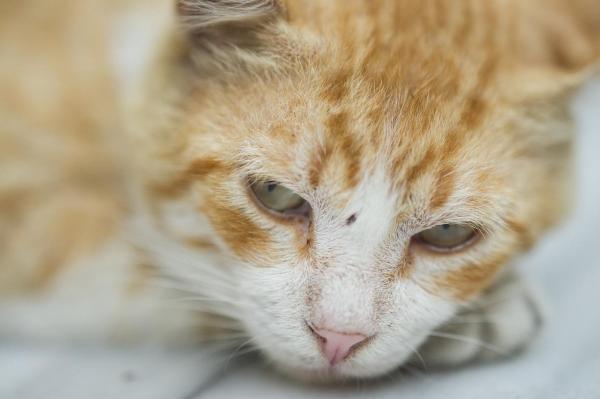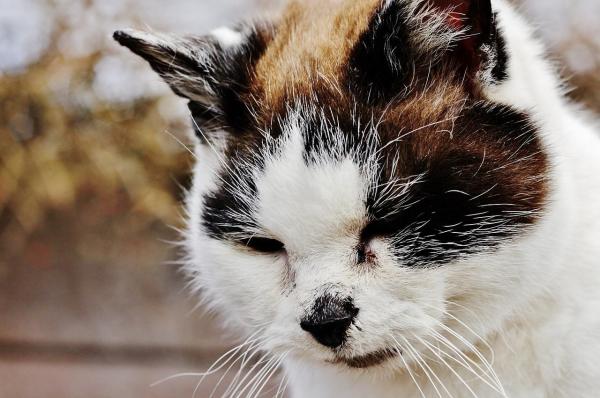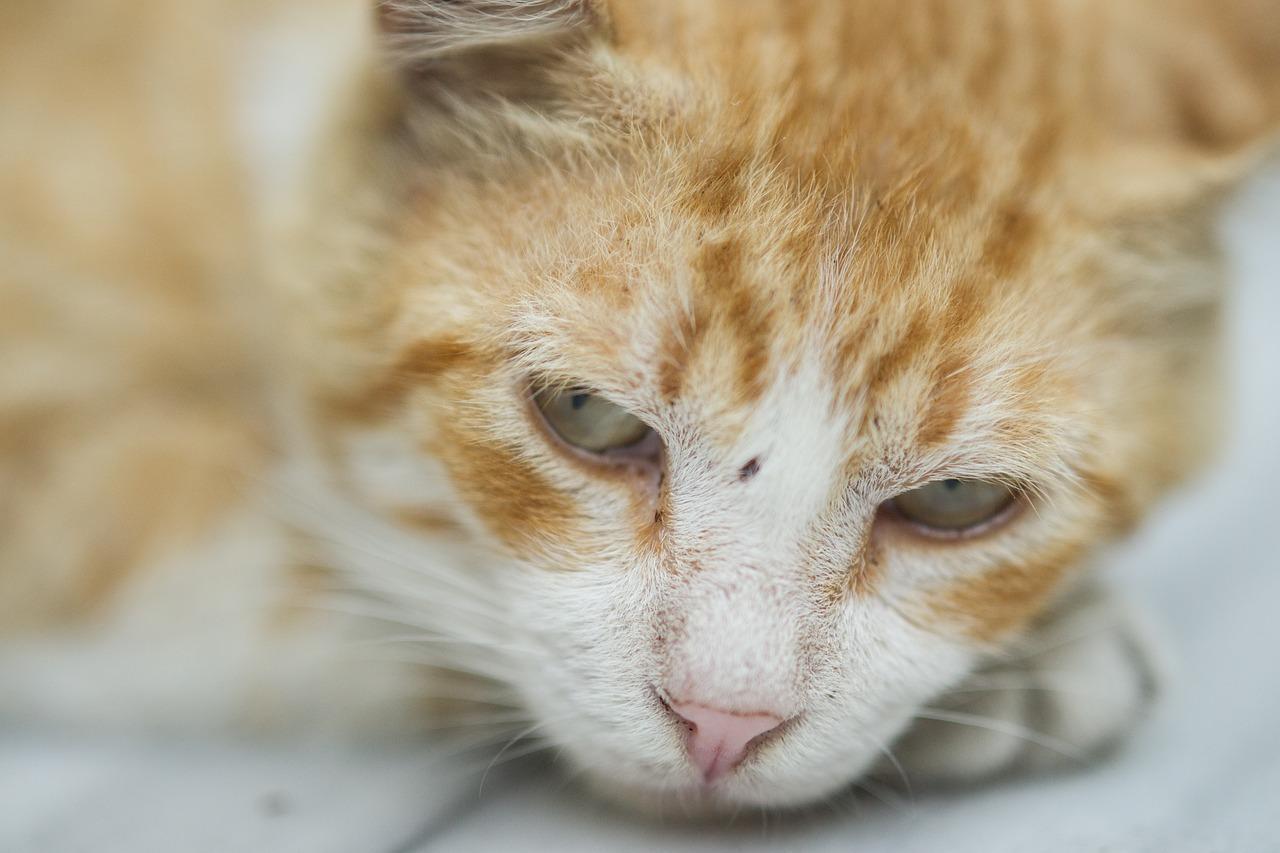My Cat Is Throwing Up Blood



See files for Cats
Any time you can see your cat's blood, there is cause for concern. If external, we might be able to look for bites or scratches which can heal easily. If internal, the cause is more difficult to determine and, in the majority of cases, more worrying. When a cat vomits blood, it means the blood is coming from somewhere in their digestive tract. It doesn't mean it is necessarily due to something they ate. What the blood looks like will help determine where in the gastrointestinal tract it has come from.
At AnimalWised, we explain what happens when your cat is throwing up blood. We look at the various causes of this phenomenon and what we can do about it.
- Is my cat vomiting blood?
- Risk factors of a cat vomiting blood
- Cat throwing up blood due to poisoning
- Cat throwing up blood due to gastrointestinal ulcers
- Cat vomiting blood due to physical trauma
- Cat throwing up blood due to bacterial infection or parasites
- Hematemesis in cats as a symptom of another disease
- Preventing a cat throwing up blood
Is my cat vomiting blood?
In some cases, it will be obvious that a cat is vomiting blood. There will be bright red fresh blood in their vomit. This means the blood has emerged from somewhere in the upper part of their gastrointestinal system (mouth, esophagus, etc.).
However, when the blood enters the stomach (or comes from the stomach) it will begin digestion. The gastric acids in the stomach and the process of going through the rest of the lower gastrointestinal tract will have an affect on its color. Instead of the bright red of fresh blood, it will darken. Digested blood will look various shades of purple, brown and even black, depending on how much it has been digested.
When the blood is coming from the lower GI tract, it won't be from further than the small intestine. This is because the blood will then come out in their feces, rather than be vomited back up through the digestive system. Unless the blood is coming from near the very end of the GI tract, it will be dark and maybe even black. It can appear in diarrhea or harder stools. If a cat is urinating blood, it will turn the urine different shades of red or brown, depending on how much blood is present.
Vomiting blood is known as hematemesis. When a cat is throwing up blood, it is important to distinguish this from coughing up blood. If a cat coughs up blood, it will be from the respiratory tract. Also, fresh streaks of red blood in phlegm or sputum are not hematemesis as they are not from vomit.
Risk factors of a cat vomiting blood
When our cat vomits blood, it is easy to think the worst. Since the are various causes of hematemesis in cats, we should know not all causes are life threatening, all some are. To know the risk factors involved and to help the veterinarian determine diagnosis, we will need to consider the following factors:
- Cat's age
- Vaccination status
- Deworming status
- Other symptoms (diarrhea, weight loss, lethargy, etc.)
- Frequency
- Whether they have outside access
The above data will be considered by the veterinarian whenever they are taken to the clinic for diagnosis. In the following sections, we will present the most common causes. Additionally, we need to remember that, unlike dogs, cats do not vomit very easily. They will sometimes swallow the blood if they vomit into their mouth and eliminate it via feces.
When blood comes from the upper respiratory tract, it may come out through the mouth. For example, if the cat has a nosebleed, the blood from the nasal passages may come out through the mouth. It is important to distinguish this from hematemesis. For the causes of a cat throwing up blood, we need to consider:

Cat throwing up blood due to poisoning
If your cat has access to the outside and presents other symptoms such as bloody diarrhea as well as vomiting, we should consider poisoning. Indoor cats can ingest toxic substances, but it is usually easier to find evidence of the cat. For example, if we leave detergent out or see the cat has been eating from the trash. When the cat eats a toxic substance from outside, we are often unable to see the source.
When a cat is poisoned it can cause ruptures to the gastrointestinal tract which causes internal bleeding. It is a veterinary emergency and can have fatal consequences. When a mildly toxic substance is ingested, it can result in vomiting and diarrhea, but it should not cause bloody vomit. How much of the substance is ingested is also important.
Several substances can trigger poisoning in cats, but not all of them the cat is likely to eat. These can include certain plants which are toxic to cats. If we see evidence of the substance which is likely to have been ingested, then we should take it to the veterinarian to help with the diagnosis and prognosis. We should also remove any potentially toxic plant from the reach of the cat.
Also, cats don't necessarily have to eat the substance to ingest it. Since cats are such hygienic animals, they lick themselves regularly. When a toxic substance gets on their fur, they may ingest it when cleaning themselves. To treat poisoning in cats, the vet will often pump their stomach, replace fluids and manage the symptoms until the body recuperates.
Cat throwing up blood due to gastrointestinal ulcers
Vomiting blood can occasionally be linked to an injury which has occurred in the GI tract. Gastrointestinal ulcers occur when part of the digestive system is damaged, usually due to one of the following:
- Excess gastric acid
- Side effect of medication
- Presence of foreign bodies
- Parasites
- Tumors
While there are various causes of gastrointestinal ulcers, many are idiopathic (i.e. without evident cause). The symptoms are usually chronic, persisting over prolonged periods of time. These may start with reduced appetite leading to weight loss, non-bloody vomiting and diarrhea, and other signs before vomiting blood occurs.
Treatment of gastrointestinal ulcers in cats requires finding the cause and addressing it. Symptom management usually combines a special diet with different medications including gastric protectors. Due to the risk of severe internal hemorrhaging, the cat may need to be hospitalized. Surgery may be required, especially if the ulcer is tumor related.
Cat vomiting blood due to physical trauma
If your cat has suffered an accident, such as a fall or vehicular collision, it may cause internal bleeding leading to vomiting up blood. Since cats are keen to go up heights, falling from tall places is relatively common. This is a phenomenon known as high-rise syndrome in cats.
When we see a cat throwing up blood after an accident, we need to take them to a veterinary hospital immediately. The blood is likely due to trauma to internal organs which can fail without immediate intervention. The veterinarian will stabilize the cat and then determine the cause via various diagnostic tests. The prognosis will depend on the severity of the trauma.
Cat throwing up blood due to bacterial infection or parasites
Bacteria can enter a cat's digestive system due to various reasons. One of the most common is when they eat something they shouldn't. Whether this is due to spoiled food, feces or anything which might result in bacteria entering the body, the cat can develop an infection. If the cat has an injury already (including a gastrointestinal ulcer), the bacteria can lead to a secondary infection.
Various diagnostic tests will be carried out, but a blood test is one of the most important. This will be able to tell if bacteria is present in the blood. However, a blood test can also tell if the cat has internal or intestinal parasites. Stool samples will also be taken if parasites are suspected. However, ultrasounds and x-rays will also be carried out in case of other potential or concurrent causes.
Hematemesis in cats as a symptom of another disease
Throwing up blood can also be a sign of various other diseases. Unfortunately, it is only usually after the disease has progressed or is acute that hematemesis occurs. Diseases in cats which have throwing up blood as a symptom include:
- Cancer (including, but not limited to bowel cancer)
- Other types of tumor
- Kidney failure
- Liver failure
- Blood clotting
If the cat has recently had internal surgery, we should also consider vomiting blood as a complication. If the sutures have come loose or they have experienced additional trauma to the area, it can lead to the cat vomiting blood.

Preventing a cat throwing up blood
As we have seen, the causes that can explain why our cat vomits blood are varied, it is therefore of vital importance to go to the veterinary clinic immediately. However, there are various ways we can prevent the causes of hematemesis in cats. They include:
- Keeping them away from high places.
- Removing toxic plants and putting away toxic substances immediately after use.
- Keep windows and balconies closed.
- Maintain vaccination and deworming schedules.
- Regular veterinary checkups.
Various types of vomiting can lead to serious problems, not only if the cat throws up blood. For this reason, we should also pay attention if the cat vomits white foam or we can see yellow bile in their vomit. Below we share a video with some more general reasons why a cat might be throwing up:

This article is purely informative. AnimalWised does not have the authority to prescribe any veterinary treatment or create a diagnosis. We invite you to take your pet to the veterinarian if they are suffering from any condition or pain.
If you want to read similar articles to My Cat Is Throwing Up Blood, we recommend you visit our Other health problems category.







